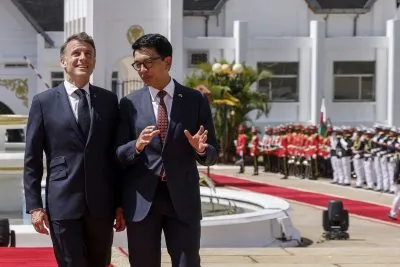It is a muggy morning in Kenya’s coastal city of Mombasa and a queue of unskilled labourers has formed around the perimeter of a downtown construction site. The lucky few at the front of the line will be admitted by the foreman and given something to do for the day.
The next morning, the same queue will form again and early arrivals will be assigned to available jobs, regardless of whether they have any previous training or experience. This informal hiring pattern will repeat every day until the construction project is complete.
Lines of job seekers like these can be seen at building sites and factories across Kenya, and they belong to the informal employment sector estimated at 15.1m people (Kenya National Bureau of Statistics, 2020).
As a youthful labour force, they are one of the economy’s most attractive aspects. But as unskilled workers they are also its greatest liability, and in the 2019 Global Competitiveness report, Kenya dropped two points, partly due to reduced scores for current and future workforce skills.
Cross-Atlantic partnerships
Five years ago, the Kenyan government partnered with CICan, a national association of colleges and post-secondary institutes in Canada, to build capacity in its technical and vocational education and training (TVET) sectors. The project targeted the country’s 10 polytechnics and, over the last four years, CICan’s Kenya Education for Employment Program (KEFEP) identified key economic sectors in each province, updated programme curricula, trained staff, and upgraded equipment.
Alain Roy, Vice President of International Partnerships at CICan (Colleges and Institutes Canada), explained that from the Canadian experience, the bulk of new jobs in an economy are within the technical and vocational sectors.
“We always use the example that for every engineer trained in a university, our economy needs seven or eight technicians and technologists. African countries have made the mistake of underinvesting at the college level,” he said.
KEFEP’s approach is therefore two-pronged: they are building capacity within the polytechnic sector, and embarking upon a rebranding exercise to change the public image of polytechnics and its graduates.
“Polytechnics are thought to be a place for failures, and there is a perception that if you are not attending a university, you are not academically able,” said CICan’s Industry Linkages Officer, Anne Kithinji.
Before joining CICan, Kithinji was a trainer and industry liaison officer at Kenya Coast National Polytechnic (KCNP) in Mombasa, where the key sectors identified for development were electrical engineering and hospitality and tourism management.
KCNP was paired with two Canadian institutions through KEFEP, and its lead partner is Camosun College in the Canadian province of British Columbia where tourism contributes the greatest value to the provincial economy, around US$7bn a year.
By establishing these institutional partnerships, CICan hopes to replicate the achievements of Canadian colleges in building connections between trades programmes and the industry.
“That way of working has produced the kinds of success we have had around employment [in Canada] where more than 90% of college graduates find employment within their field of studies within six months of graduation,” said Roy.
Similar institutional pairings – defined by key sectors of development – were therefore set up across Kenya, seeing polytechnics in Eldoret and Kitale focus on civil and agricultural engineering; Nyeri and Meru on agriculture and agro-processing (dairy focus); Kisumu, Kisii and Sigalagala on applied business technology and renewable energy (specifically solar); and Kabete and Garissa on automotive technology, industrial automation and robotics.
“We are keen to develop these partnerships because the outcomes have benefits for the country but we gain a lot too as it strengthens our colleges,” said Roy, noting that CICan’s partnerships in other parts of the world have resulted in joint applied research projects for their institutions.
The focus on industry partnerships is a thread that will ideally take centre stage as the first cohort of students begin their studies in the revamped TVET programmes in 2021, and while the initial relationship was premised on programme advisory committees, the focus will now shift to industry attachments and applied business projects.
“Everything has to start with the industry. The employers are the customers and the product is the graduate. If we don’t give the customer what they want, our graduates will be wasted. They will be obsolete. Keep the employer close and you can solve the problem,” said CICan’s Kithinji.
Want to continue reading? Subscribe today.
You've read all your free articles for this month! Subscribe now to enjoy full access to our content.
Digital Monthly
£8.00 / month
Receive full unlimited access to our articles, opinions, podcasts and more.
Digital Yearly
£70.00 / year
Our best value offer - save £26 and gain access to all of our digital content for an entire year!

 Sign in with Google
Sign in with Google 






